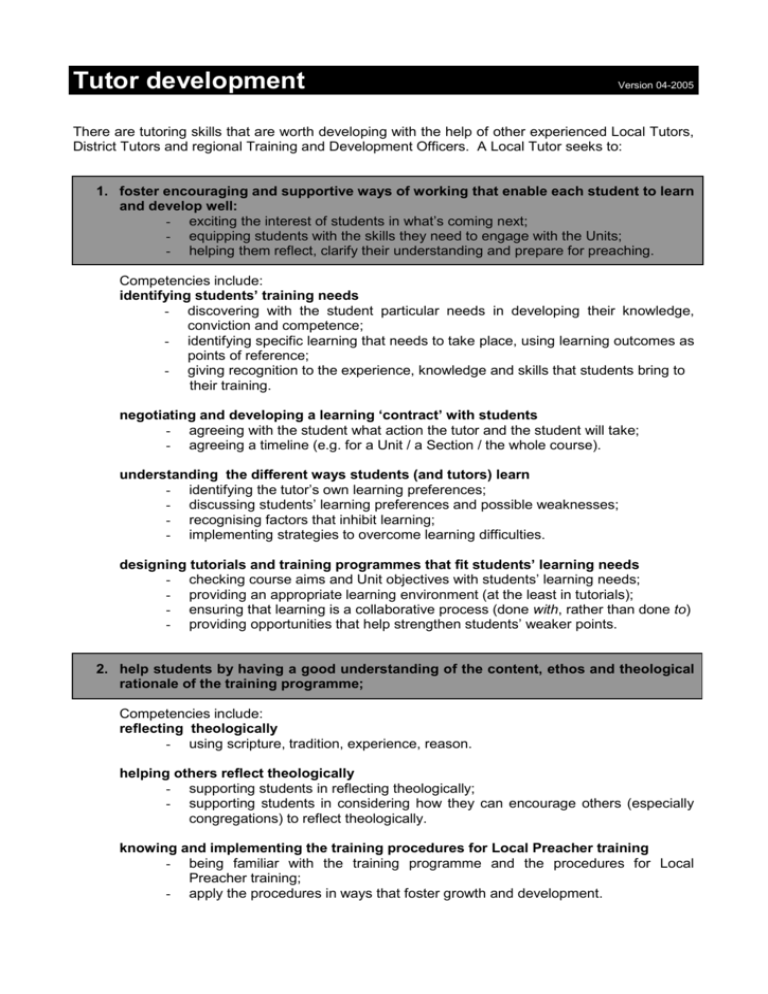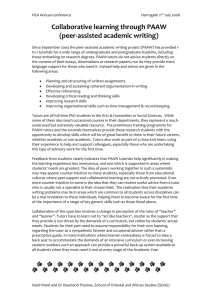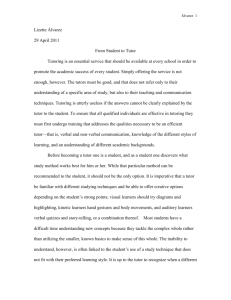Local Tutor Development
advertisement

Tutor development Version 04-2005 There are tutoring skills that are worth developing with the help of other experienced Local Tutors, District Tutors and regional Training and Development Officers. A Local Tutor seeks to: 1. foster encouraging and supportive ways of working that enable each student to learn and develop well: - exciting the interest of students in what’s coming next; - equipping students with the skills they need to engage with the Units; - helping them reflect, clarify their understanding and prepare for preaching. Competencies include: identifying students’ training needs - discovering with the student particular needs in developing their knowledge, conviction and competence; - identifying specific learning that needs to take place, using learning outcomes as points of reference; - giving recognition to the experience, knowledge and skills that students bring to their training. negotiating and developing a learning ‘contract’ with students - agreeing with the student what action the tutor and the student will take; - agreeing a timeline (e.g. for a Unit / a Section / the whole course). understanding the different ways students (and tutors) learn - identifying the tutor’s own learning preferences; - discussing students’ learning preferences and possible weaknesses; - recognising factors that inhibit learning; - implementing strategies to overcome learning difficulties. designing tutorials and training programmes that fit students’ learning needs - checking course aims and Unit objectives with students’ learning needs; - providing an appropriate learning environment (at the least in tutorials); - ensuring that learning is a collaborative process (done with, rather than done to) - providing opportunities that help strengthen students’ weaker points. 2. help students by having a good understanding of the content, ethos and theological rationale of the training programme; Competencies include: reflecting theologically - using scripture, tradition, experience, reason. helping others reflect theologically - supporting students in reflecting theologically; - supporting students in considering how they can encourage others (especially congregations) to reflect theologically. knowing and implementing the training procedures for Local Preacher training - being familiar with the training programme and the procedures for Local Preacher training; - apply the procedures in ways that foster growth and development. being inclusive and anti-discriminatory - agreeing ‘ground rules’, expectations of behaviour; - providing an accessible venue for tutorials; - implementing equal opportunities policies of the Methodist Church; - accepting one’s own practice and views being challenged; - using inclusive language; - challenging discriminatory attitudes and practice of others. 3. assess students’ development in knowledge, conviction and competence (using the programme’s assessment criteria) in order to offer constructive criticism and support that promote learning and development; - the marking of assignments; - giving feedback on the student’s leading of worship and preaching etc; - helping Local Preachers On Trial to explore their call. Competencies include: assessing and evaluating effectively - assessing how well a particular approach to learning has worked; what factors made it effective or ineffective; - monitoring student development in knowledge, understanding, application and evaluation; - using assignment commentaries and applying training programme criteria to assess students’ work; - making constructive comments that foster growth and development, using approaches like those described in the Local Tutors’ handbook. applying relevant learning methods - making use of ‘Helping students learn’ in the Local Tutors’ handbook; - applying theories about how groups behave; - checking with tutorial group members how they are getting on; - providing opportunities to apply new learning. reflecting on our own development as a tutor - practising and developing in tutoring skills; - using this checklist to consider the tutor’s own strengths and training needs; - discussing training needs and opportunities for support with: o Local Tutors in neighbouring Circuits; o the District Tutor and/or o the regional Training and Development Officer. The three aspects of being a Local Tutor and the competencies that contribute to the three aspects are not exclusive to the task of tutoring Local Preachers. There are others engaged in similar tutoring tasks with people who are pursuing training or development for other ministries in the Church. They would recognise the aims and skills that you are working with as very close to their own aims and skills. There is special value in Local Tutors networking with each other (usually with the help of a District Tutor). However, we should not lose sight of the possibility that networking with other trainers and tutors could also be mutually beneficial.





